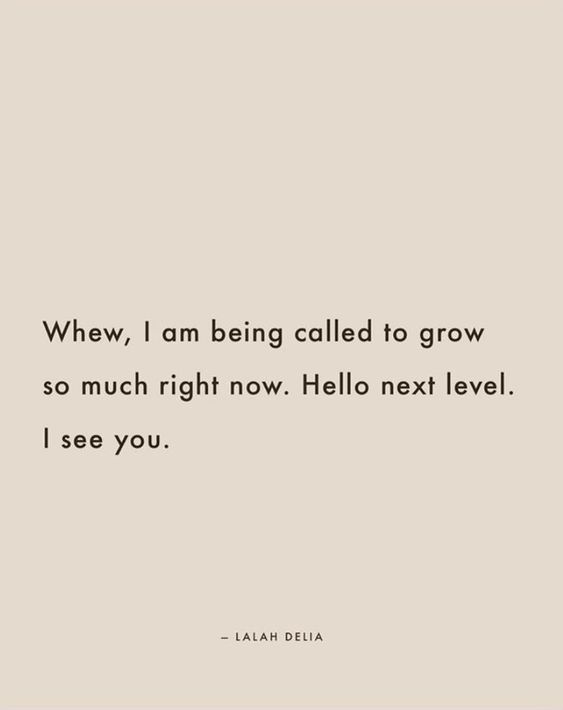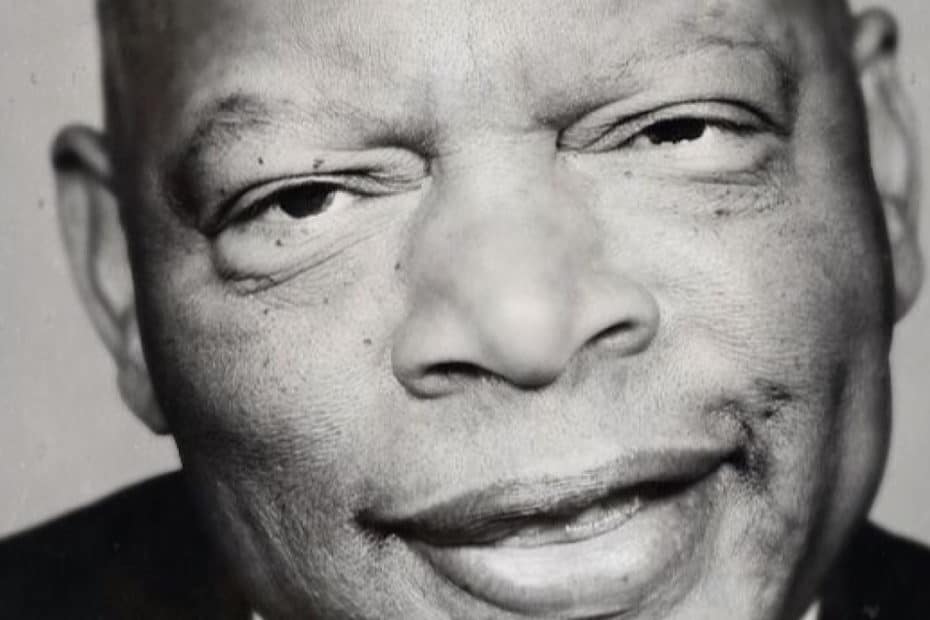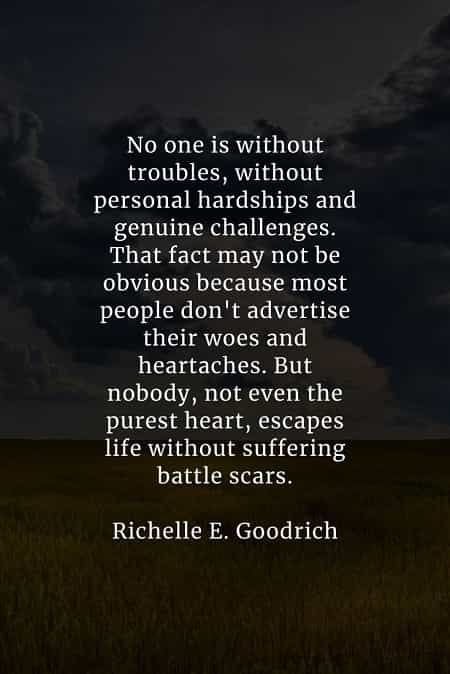“It’s easy to imagine that over there, just a few steps ahead, our problems will disappear. Pessimists, of course, are sure that instead of disappearing, tomorrow will make things worse. The truth is pretty simple: All we do, all we ever do, is trade one set of problems for another. Problems are a feature. They’re the opportunity to see how we can productively move forward. Not to a world with no problems at all, but to a situation with different problems, ones that are worth dancing with.”
Seth Godin, Blog
“You will not grow if you sit in a beautiful flower garden, but you will grow if you are sick, if you are in pain, if you experience losses, and if you do not put your head in the sand, but take the pain and learn to accept it, not as a curse or punishment but as a gift to you with a very, very specific purpose.”
Elisabeth Kübler-Ross, via Sunbeams (Page 91)
Claire Wineland Quote on Challenges and How To Keep Moving Forward When You Feel Stuck
“I’m not stuck in this belief that challenges are given to us to hold us back. I am lifted up by the belief that challenges are here to help us move forwards—and that is the difference. That is the only difference between people who are living a passionate, proud life and people who feel sad—or people who get older and feel like they don’t know what they’re doing anymore.”
Claire Wineland (15), TEDxMalibu
Beyond the Quote (342/365)
When you feel stuck in your life it’s because you’ve reached a limit; you’ve hit a wall; you’ve arrived at a boundary; you’ve reached an edge in your understanding. And you can’t pass until you figure out a way to scale the wall; cross the boundary; and/or explore what’s beyond those limits. Figure out being the key phrase in that sentence. Being stuck is a problem to be solved—not a permanent state of being. It involves critical thinking, research and reflection, trial and error, conversation, and more. And while this all may sound obvious, it certainly isn’t common practice.
Read More »Claire Wineland Quote on Challenges and How To Keep Moving Forward When You Feel Stuck“If it were easy then everyone else would find it easy as well. Which would make it awfully difficult to do important work, work that stands out, work that people would go out of their way to find. When difficulties arise, it might very well be good news. Because those difficulties may dissuade all the people who aren’t as dedicated as you are. It pays to seek out the hard parts.”
Seth Godin, Blog
An Empowering Short Story from John Lewis’ Memoire on Saving His Aunt’s House (and How We Might Save Ours, Too)
Excerpt: In this powerful story, John Lewis recounts a time when a terrible storm threatened his aunt’s house and how he and those around him saved it.
Read More »An Empowering Short Story from John Lewis’ Memoire on Saving His Aunt’s House (and How We Might Save Ours, Too)
“People ask me, ‘What is the use of climbing Mount Everest?’ and my answer must at once be, ‘It is of no use.’ There is not the slightest prospect of any gain whatsoever. Oh, we may learn a little about the behavior of the human body at high altitudes, and possibly medical men may turn our observation to some account for the purposes of aviation. But otherwise nothing will come of it. We shall not bring back a single bit of gold or silver, not a gem, nor any coal or iron… If you cannot understand that there is something in man which responds to the challenge of this mountain and goes out to meet it, that the struggle is the struggle of life itself upward and forever upward, then you won’t see why we go. What we get from this adventure is just sheer joy. And joy is, after all, the end of life. We do not live to eat and make money. We eat and make money to be able to live. That is what life means and what life is for.”
George Mallory, Climbing Everest
Andy Andrews Quote on Leadership and How To Properly Influence Others To Keep Moving Forward
“It is never the duty of a leader to struggle for someone else; a leader must encourage others to struggle and assure them that the struggles are worthwhile. Do battle with the challenges of your present, and you will unlock the prizes of your future.”
Andy Andrews, The Traveler’s Gift
Beyond the Quote (219/365)
I repeat: It is never the duty of a leader to struggle for someone else. Nor is it their duty to take the struggle away from, to suffer the pain for, or to handle challenges that someone else is facing. A leader needs to live their own life as much as the follower needs to live theirs. But even more importantly, it is the duty of the leader to lead the follower to a better place—and doing the work for them doesn’t get them there. If anything, it handicaps them and makes them more vulnerable to the future rather than more resilient.
Read More »Andy Andrews Quote on Leadership and How To Properly Influence Others To Keep Moving ForwardIain Thomas Quote on What To Do When The World Is Wearing You Down
“The world will always wear you down, so let it wear you down until only the good remains. Hold on to the incredible parts of you that survive.”
Iain Thomas, Every Word You Cannot Say (Page 93)
Beyond the Quote (180/365)
The world will always be this way. Life will continue to be relentless and will certainly try to wear you down. So, let it. If you can’t control the world, why bother trying to control it? Don’t resist what happens. Don’t resist what is. Let life send its blessings your way and let life send its storms, too. If the world is going to wear you down, let it wear down the worst parts of you. Don’t let it break down what’s beautiful. Don’t let it harden you up. Don’t let it steal away your vulnerability. Hold on to the parts of you that make you proud to be you. Hold on to hope and love and beauty and joy and gratitude and individuality. And let the storms wear down and wash away what’s faulty, unnecessary, and not you.
Read More »Iain Thomas Quote on What To Do When The World Is Wearing You DownBrianna Wiest Quote on The Point Of Mountains
“One day, the mountain that is in front of you will be so far behind you, it will barely be visible in the distance. But the person you become in learning to get over it? That will stay with you forever. And that is the point of the mountain.”
Brianna Wiest
Beyond the Quote (142/365)
Yesterday, two friends and I set out to do a 14 mile hike through three high peaks in the Adirondack Mountains. We knew from the get-go that it was going to be strenuous and intense at times, but that’s a part of the experience. You can’t just walk on flat ground if you want to summit a mountain. If you want the reward that comes with summiting, you have to conquer all of the challenges that come with hiking. No challenge, no reward.
Read More »Brianna Wiest Quote on The Point Of Mountains“To live is to deal with challenges and setbacks. No one is immune to the bullshit life flings our way; but our actions can make that bullshit better or worse. If you look back at your life, the biggest lessons you learned didn’t come from a Tumblr quote or celebrity PSA; they came from harsh reality checks when the shit hit the fan. That process isn’t going to get any more enjoyable as you grow, but if you anticipate the learning, then the moments you have in life end up being that much more enriched.” ~ Humble the Poet, Things No One Else Can Teach Us (Page 84)
Seth Godin Quote on Quitting—Quitting More So You Can Focus More On What Matters [Plus 30 Things to Consider Quitting]
“Sticking things out is overrated, particularly if you stick out the wrong things. In fact, I think you’d be much better off quitting most of what you do so you have the resources to get through the hard slog I call the Dip. The challenge, then, is to not quit in the Dip, but instead to quit everything else so you have the focus to get through the slog of what matters.”
Seth Godin, Whatcha Gonna Do With That Duck?
Beyond the Quote (71/365)
What should we stick out and what should we quit? I can tell you that the list of things we should stick out is far smaller than the list of things we should quit. And after some reflection, what you might find is that your list of things that you’ve been sticking out is WAY bigger than you might have imagined it to be and the things you SHOULD be sticking out might not even be making it to your daily to-do list at all. My instinct tells me that the follow 6 things are worth sticking out without explaination: Reading, Writing, Exercising, Meditating, Learning, and Connecting.
Read More »Seth Godin Quote on Quitting—Quitting More So You Can Focus More On What Matters [Plus 30 Things to Consider Quitting]Stephen Cope Quote on Engaging With Life Rather Than Retreating—On Doing What’s Meaningful Rather Than Fun
“At the end of life, most of us will find that we have felt most filled up by the challenges and successful struggles for mastery, creativity, and full expression of our dharma in the world. Fulfillment happens not in retreat from the world, but in advance – and profound engagement.”
Stephen Cope, The Great Work Of Your Life
Beyond the Quote (64/365)
After receiving a thunderous round of applause for a speech he gave, Dr. Jordan B. Peterson was asked if he was having fun giving speeches and talking about important intellectual topics. When he replied, “No,” I was caught off guard. I couldn’t understand how he could so eloquently CRUSH an hour and a half long speech, do it in a way that was so well received by the audience, laugh and joke throughout, and admit that he didn’t have fun while doing it?
Read More »Stephen Cope Quote on Engaging With Life Rather Than Retreating—On Doing What’s Meaningful Rather Than Fun“You are only as mentally tough as your life demands you to be. An easy life fashions a mind that can only handle ease. A challenging life builds a mind that can handle challenge. Like a muscle that atrophies without use, mental strength fades unless it is tested. When life doesn’t challenge you, challenge yourself.” ~ James Clear, Blog
“Even if it were possible to permanently banish everything threatening—everything dangerous (and, therefore, everything challenging and interesting)—that would mean only that another danger would emerge: that of permanent human infantilism and absolute uselessness. How could the nature of man ever reach its full potential without challenge and danger? How dull and contemptible would we become if there was no longer reason to pay attention?” ~ Jordan Peterson, via 12 Rules for Life (Page 47)






